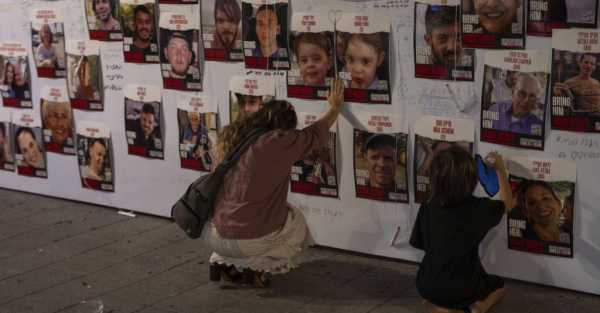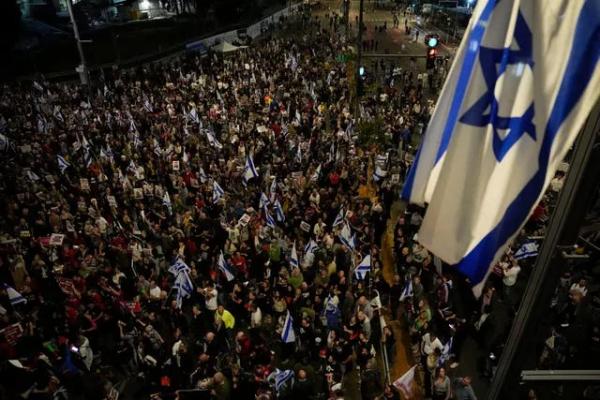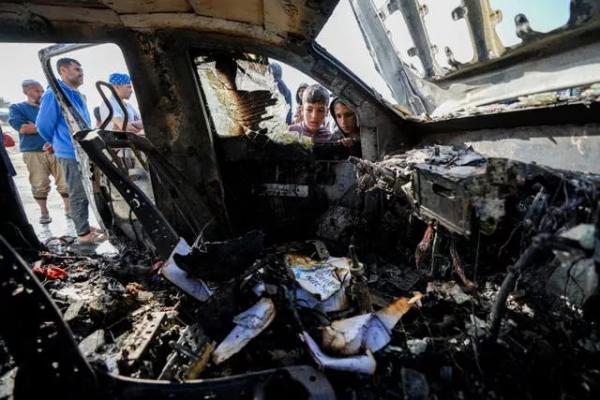
Israel’s military said on Saturday it had recovered the body of a 47-year-old farmer who was held hostage in Gaza.
It came as negotiators prepared to begin another round of talks on brokering a ceasefire and securing the release of the remaining hostages, six months into the war, and protests against Israeli Prime Minister Benjamin Netanyahu’s government took place in Tel Aviv.
Israel’s army said it had found the body of Elad Katzir and believed he was killed in January by militants with Islamic Jihad, one of the groups that entered southern Israel in the October 7 attack, killed more than 1,200 people and took about 250 hostages.
Mr Katzir had been abducted along with his mother, Hanna, who was released in November. His father, Avraham, was killed during the attack in Nir Oz, a border community that suffered some of Israel’s heaviest losses.
“He could have been saved if a deal had happened in time,” Mr Katzir’s sister Carmit said in a statement.
“Our leadership is cowardly and driven by political considerations, and that is why (a deal) did not happen.”

The discovery renewed pressure on Israel’s government for a deal to get the remaining hostages freed, as families have long feared time is running out. At least 36 hostages in captivity have been confirmed dead, while about half of the original number have been released.
Meanwhile, the toll of Israel’s ongoing offensive in Gaza is measured in tens of thousands of deaths and more than a million Palestinians displaced.
“We have arrived at a terrible milestone,” the UN humanitarian chief Martin Griffiths said in a statement marking six months and noting “the immediate prospect of a shameful man-made famine”.
Mr Griffiths added: “We face the unconscionable prospect of further escalation in Gaza, where no one is safe and there is nowhere safe to go. An already fragile aid operation continues to be undermined by bombardments, insecurity and denials of access.”
Israelis are divided on the approach by Mr Netanyahu and his government after multiple rounds of stalled ceasefire negotiations. A week ago, tens of thousands of Israelis thronged central Jerusalem in the largest anti-government protest since the country went to war.
Further protests took place in Tel Aviv on Saturday.

The negotiations will resume on Sunday, according to an Egyptian official and Egypt’s state-owned Al Qahera TV. The official spoke on condition of anonymity because they were not authorised to speak publicly about the negotiations.
US President Joe Biden has sent CIA director Bill Burns to Egypt for additional talks about the hostages, a ceasefire and securing the country’s border with Gaza.
Some Israel allies are now considering halting arms sales. Mr Biden warned Mr Netanyahu that future US support for the war depends on swift implementation of new steps to protect civilians and aid workers.
A Hamas delegation will arrive on Sunday to join the talks, the militant group said.
“We need security guarantees for us as humanitarians but also for the people we serve,” said Marika Guderian with the World Food Program, speaking inside Gaza.
Hamas has insisted on linking a phased end to the war — not a temporary ceasefire — to any agreement releasing hostages. It has said it will agree to release 40 hostages as part of an initial six-week ceasefire deal that would include the release of Palestinian prisoners from Israeli jails.
Hamas also has demanded the return of displaced people to devastated northern Gaza and an increase in the delivery of humanitarian aid throughout the territory.
Israel has offered to allow only 2,000 displaced Palestinians — mainly women, children and older people — to the north daily during the proposed six-week ceasefire.
The efforts to revive negotiations come days after international condemnation of Israeli airstrikes that killed seven humanitarian workers with the World Central Kitchen charity. The Israeli military has described the strike as a tragic error. Aid groups say the mistake is hardly an anomaly.
“We need security guarantees for us as humanitarians but also for the people we serve,” said Marika Guderian with the World Food Programme, speaking inside Gaza.

The humanitarian group Oxfam says people in northern Gaza have survived on an average of 245 calories a day since January. Israel has promised to open more border crossings into Gaza and increase the flow of aid.
Israel has promised to open more border crossings into Gaza and increase the flow of aid. The UN says that in March, 85% of trucks with food aid were denied or impeded.
The war’s death toll in Gaza is now 33,137, the territory’s Health Ministry said. Its toll does not differentiate between civilians and combatants, but it has said women and children make up the majority of the dead.
The ministry said the bodies of 46 Palestinians killed in Israeli airstrikes had been brought to hospitals in the past 24 hours — the lowest such daily tally in months.
Israel has blamed Hamas for civilian deaths in Gaza, accusing it of operating in residential communities and public areas like hospitals.
Gaza’s southernmost city of Rafah now holds more than half of the territory’s 2.3 million people, and Israel’s vow to carry out a ground offensive there has caused weeks of dread and warnings even from Israel’s top ally, the United States.
An Egyptian official on Friday called Israel’s most recent proposal to evacuate civilians from Rafah an “unrealistic and unworkable plan”.
Egypt rejected it and again threatened to suspend parts of the 46-year-old Camp David Accords that facilitate security co-operation between the states.
Sourse: breakingnews.ie